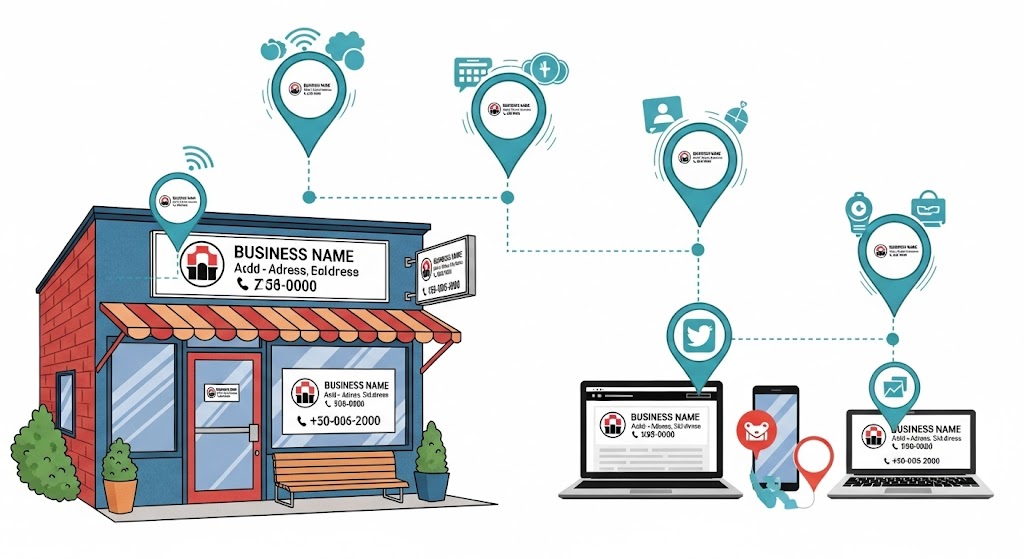Google's most important ranking algorithm comes from Off-page SEO. The entire SEO power depends on it.
Off-page SEO is about things you do outside your website to make it rank higher in search results. It helps people and search engines see your site as reliable and trustworthy. This means getting other websites to link to yours and being mentioned in local listings.
In this blog post, we’ll cover the importance of Off-Page SEO and how to do it. As well as discussing the difference between On-Page and Off-Page SEO.
What Is Off-Page SEO: Importance Of Off-Page SEO

Any successful online strategy must include off-page SEO. It involves activities outside your website that impact your rankings within search engine results. Let's explore why it's important and how it benefits your online presence.
Boosting Search Engine Rankings
Off-Page SEO plays a key role in where your website appears on search engines.
- Backlinks: By linking your site to others' sites, search engines know that it has value.
- Authority: High-quality backlinks from trusted sites enhance your site's authority and credibility.
- Popularity: More links from different sites suggest your content is useful and relevant.
Enhancing Online Visibility and Brand Reputation
Beyond rankings, Off-Page SEO helps in building your brand's presence and reputation on the internet.
- Social Media: Engaging content shared across social platforms can drive traffic to your site.
- Brand Mentions: Getting mentioned by other sites increases awareness and trust in your brand.
- Media Coverage: Positive stories or features by media outlets can significantly enhance your brand's image.
Building Relationships and Community Engagement
Effective Off-Page SEO isn't just about links; it's about connecting with people.
- Networking: Collaborating with other industry players can open doors to new opportunities.
- Community Involvement: Participating in forums and discussions showcases your expertise and builds trust.
- Customer Interaction: Engaging with your audience fosters loyalty and encourages positive word-of-mouth.
On-Page SEO vs. Off-Page SEO
Let's dive into what makes On-Page SEO vs. Off-Page SEO unique and how they work together.
What is On-Page SEO?
On-page SEO requires optimizing elements on your website to improve search engine rankings.
- Keyword Optimization: Use the right words to match what people search for.
- Meta Tags: Provide brief info about your page to search engines.
- Internal Linking: Connect different pages within your site for better navigation.
What is Off-Page SEO?
Off-page SEO focuses on tasks outside your website to boost your site's reputation and visibility.
- Backlinks: Earn links from other sites to show credibility.
- Social Media: Connect with your audience on Facebook and Twitter.
- Brand Mentions: Get your brand talked about across the web.
Key Differences
While both strategies aim to improve your site's ranking, they do so in different ways.
- On-Page SEO: Concentrates on internal content and site structure.
- Off-Page SEO: Relies on external factors like backlinks and social signals.
The Power of a Balanced SEO Strategy
Combining On-Page and Off-Page SEO leads to the best results. Here's why balance is important:
- Comprehensive Approach: Cover all bases by optimizing both on-site and off-site elements.
- Increased Visibility: Improve your chances of ranking higher in search results.
- Stronger Authority: Build a trustworthy and authoritative online presence.
Off-Page SEO: Effective Techniques To Follow

Here are some techniques you can use to boost your online presence through content marketing.
Focus on Link Building
Off-page SEO involves link building. Here, we'll explore different ways to build links effectively.
Broken Link Building
Building broken links is a great way to boost your SEO. It requires finding broken links on other websites and fixing them with your own content.
- Find Broken Links: Use tools to identify broken links on relevant websites.
- Create Valuable Content: Make sure you have useful content that can replace the broken links.
- Reach Out: Contact the website owner to suggest your content as a replacement.
Unlinked Brand Mentions
Sometimes, websites mention your brand without linking back to you. Turning these mentions into backlinks can improve your site’s authority.
- Identify Mentions: Use tools to find where your brand is mentioned without a link.
- Contact the Site: Politely ask the site owner to add a link to your website.
Journalist Requests
Journalists often need expert opinions for their articles. Providing insights can lead to valuable backlinks.
- Sign Up for Services: Join platforms where journalists request expertise.
- Respond Promptly: Offer your knowledge quickly and professionally.
- Gain Backlinks: If your input is used, you may receive a backlink.
Backlink Building
Having a diverse set of backlinks from different authoritative sites is crucial for SEO success.
- Research Authoritative Sites: Identify high-quality websites in your industry.
- Build Relationships: Engage with these sites through comments or social media.
- Guest Post: Offer to write articles for these sites, including a link back to your own site.
Content Marketing

Your audience can be engaged and attracted if you create and share valuable content. It's a powerful tool for connecting with people and boosting your SEO.
Digital PR
Digital PR uses modern public relations methods to make your online presence stronger.
- Build relationships with online journalists and bloggers.
- Secure features in online publications.
- Gain backlinks from reputable sites.
Social Media
Your audience can be reached more easily and directly through social media.
- Share engaging posts to attract followers.
- Use hashtags to increase post visibility.
- Interact with followers to build a community.
Influencer Marketing
Reaching more people can be achieved by working with influencers and build trust.
- Identify influencers in your industry.
- Collaborate on content that benefits both parties.
- Use influencers to introduce your brand to a new audience.
Guest Posting
Writing posts for other blogs can help you gain exposure and valuable backlinks.
- Find reputable blogs that accept guest posts.
- Write content that provides value to their audience.
- Include a link back to your site in the post.
Podcasts
Those who prefer audio content can benefit from podcasts.
- Start your own podcast or be a guest on others.
- Share insights and stories related to your field.
- Use social media to promote your podcast.
Content Syndication
Republishing your content on different platforms can reach a broader audience.
- Use platforms like Medium or LinkedIn to share content.
- Ensure attribution and links back to your original post.
- Reach new audiences without creating new content.
Forums
By participating in forums, you can gain access to niche communities.
- Join forums related to your industry.
- Provide helpful answers and insights.
- Your profile or signature should include a link to your website.
Local SEO
Local SEO helps your business show up in local searches. It's about making sure people near you can find your business easily when they look online.
Google Business Profile Management
Your Google Business Profile is crucial for local searches. Here’s how you can optimize it:
- Keep It Updated: Regularly update your business hours, services, and photos.
- Use Keywords: Add relevant keywords to your business description.
- Encourage Reviews: Ask happy customers to leave positive reviews.
NAP SEO

NAP is short for Name, Address, and Phone number. It's important for your contact details to be the same everywhere online.
- Consistency Is Key: Ensure your business name, address, and phone number are exactly the same across all websites and directories.
- Check Regularly: Review your listings often to ensure accuracy.
- Update Changes: Immediately update any changes to your NAP information.
Customer Reviews
In the realm of Off-Page SEO, positive customer reviews are a vital element that significantly impacts your online reputation and trustworthiness. Here’s how businesses can effectively encourage and gather positive reviews from their customers.
Ask for Reviews
- Timing is Key: Right after a successful purchase or service completion is the ideal time to ask for a review. Customers are most engaged and likely to share their positive experiences.
- Personalize Your Request: Use the customer's name and reference their specific purchase or service to make your request feel personal and genuine.
Make It Easy
- Simplify the Process: Provide clear, step-by-step instructions on how to leave a review. Make sure your review platforms are linked directly to your website to save your customers time.
- Use Multiple Platforms: Encourage reviews on various platforms, such as Google, Yelp, and social media, to increase your visibility and authenticity.
Offer Incentives
- Reward Loyalty: Offer small discounts, loyalty points, or freebies as a thank you for taking the time to leave a review. Ensure that these incentives comply with review platform guidelines.
- Host a Giveaway: Create a monthly draw to reward customers who leave reviews. This strategy can motivate more customers to participate.
Leverage Email Marketing
- Automated Follow-ups: Use email marketing tools to send follow-up emails post-purchase, gently reminding customers to leave a review.
- Express Gratitude: Thank them for their business and support in the email, making your request feel more appreciative than transactional.
Utilize Social Media
- Engage Your Audience: Make use of social media to highlight positive reviews and customer testimonials. This not only encourages others to leave reviews but also strengthens your brand’s credibility.
- Create Hashtags: Develop a unique hashtag for customers to use when sharing their experiences online. This can create a sense of community and encourage more participation.
Train Your Team
- Empower Employees: Ensure that your team understands the importance of positive reviews and is trained to ask for them in a friendly and professional manner.
- Role-Playing Scenarios: Regularly practice different scenarios with your team to help them become comfortable and confident in requesting reviews from customers.
SEO and Branding with Events

The power of events lies in their ability to connect with your audience and expanding your reach. By engaging in events, you can not only promote your brand but also improve your SEO through networking and backlinks.
Host or Participate in Events
Taking part in events, whether virtual or in-person, offers numerous benefits:
- Networking Opportunities: Meet industry leaders and potential collaborators.
- Brand Exposure: Increase brand awareness by showcasing your expertise.
- Community Engagement: Build relationships with your audience and industry peers.
Gain Backlinks and Media Mentions
Events can also help you in earning valuable backlinks:
- Media Coverage: Media outlets often cover significant events, providing backlinks to your site.
- Influencer Partnerships:Collaborate with influencers who can link to your site in their content.
- Guest Blogging: Write about your event experiences on other websites to gain exposure and backlinks.
Conclusion:
Incorporating off-page SEO techniques is vital for creating a well-rounded SEO strategy that generates real results.
Whether building backlinks, engaging in content marketing, or managing online reviews, these tactics help establish your site’s credibility and authority. Experimenting with different off-page SEO strategies allows you to discover what works best for your business.
FAQs
On-page SEO involves optimizing elements within your site, such as content and meta tags, to boost search engine rankings. Off-page SEO focuses on activities outside your website, like building backlinks and social media engagement, to enhance its authority and relevance. Together, they help increase visibility and traffic to your site.
Off-page SEO can be challenging as it involves building backlinks, improving domain authority, and enhancing brand reputation, which requires strategic effort and patience.

